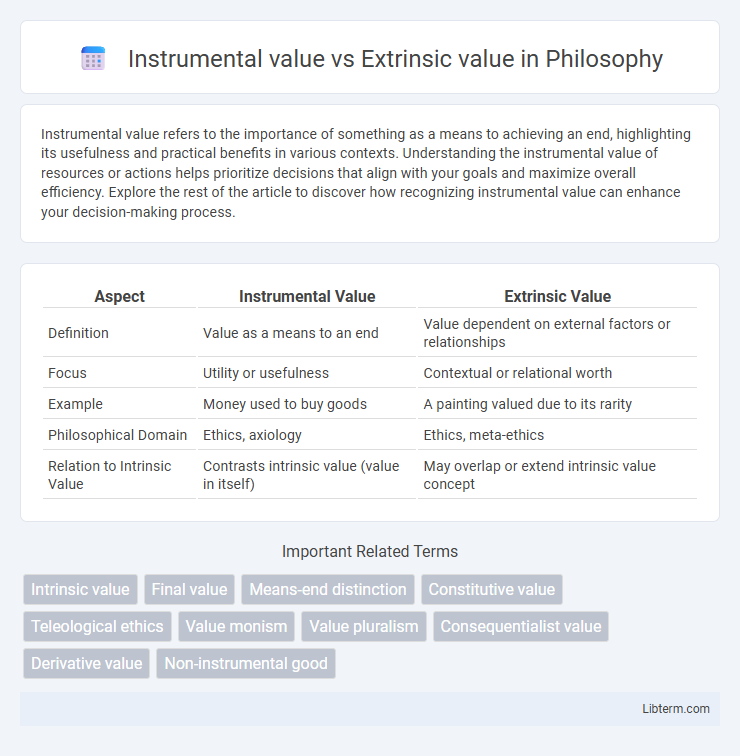Instrumental value refers to the importance of something as a means to achieving an end, highlighting its usefulness and practical benefits in various contexts. Understanding the instrumental value of resources or actions helps prioritize decisions that align with your goals and maximize overall efficiency. Explore the rest of the article to discover how recognizing instrumental value can enhance your decision-making process.
Table of Comparison
| Aspect | Instrumental Value | Extrinsic Value |
|---|---|---|
| Definition | Value as a means to an end | Value dependent on external factors or relationships |
| Focus | Utility or usefulness | Contextual or relational worth |
| Example | Money used to buy goods | A painting valued due to its rarity |
| Philosophical Domain | Ethics, axiology | Ethics, meta-ethics |
| Relation to Intrinsic Value | Contrasts intrinsic value (value in itself) | May overlap or extend intrinsic value concept |
Understanding Instrumental Value
Instrumental value refers to the usefulness of an object, action, or concept as a means to achieve a desired end or goal, highlighting its practical significance. Understanding instrumental value involves recognizing how certain items or behaviors serve as tools or facilitators to obtain extrinsic benefits or intrinsic rewards. This concept is critical in economics, ethics, and decision-making frameworks where the utility of resources is evaluated based on their contribution to achieving broader objectives.
Defining Extrinsic Value
Extrinsic value refers to the worth that an object or action holds because of its usefulness or ability to lead to a desired outcome, rather than for its inherent qualities. Unlike intrinsic value, which is valued for its own sake, extrinsic value depends on external factors and the context in which the value is assigned. This distinction highlights how instrumental value is a specific form of extrinsic value, emphasizing the means to an end rather than the end itself.
Key Differences Between Instrumental and Extrinsic Value
Instrumental value refers to the worth of something as a means to achieve an end, emphasizing its utility or functionality in accomplishing a goal. Extrinsic value, often used interchangeably but broader, denotes value derived from an object or action because of external factors or outcomes rather than inherent qualities. The key difference lies in instrumental value being specifically tied to usefulness towards a purpose, whereas extrinsic value encompasses any external source of value beyond intrinsic or inherent worth.
Historical Perspectives on Value Theory
Historical perspectives on value theory differentiate instrumental value, which regards objects or actions as valuable for the sake of achieving a separate goal, from extrinsic value, where value is derived from an object's relationship to external factors or consequences. Philosophers like Aristotle emphasized instrumental value through the concept of "means to an end," while later utilitarians highlighted extrinsic value by assessing outcomes' utility. This distinction underpins evolving ethical frameworks that evaluate moral worth based on ends versus relational or consequential significance.
Practical Examples of Instrumental Value
Instrumental value refers to the usefulness of an object or action as a means to achieve a specific goal, such as money being valued for its ability to purchase goods or tools used to construct buildings. In practical terms, a smartphone holds instrumental value by enabling communication, access to information, and productivity applications. Conversely, extrinsic value encompasses the worth of something based on external factors or outcomes, often overlapping with instrumental value but distinguished by its dependence on external validation or utility.
Real-World Applications of Extrinsic Value
Extrinsic value is widely applied in economics and finance to determine the worth of assets based on external factors, such as market demand or potential for profit, rather than inherent qualities. In environmental policy, extrinsic value helps assess ecosystem services by quantifying benefits like carbon sequestration or water purification that ecosystems provide to human society. Corporate social responsibility initiatives leverage extrinsic value by aligning business practices with societal values, enhancing brand reputation and stakeholder trust.
Instrumental Value in Ethics and Philosophy
Instrumental value in ethics refers to the worth of an object or action as a means to achieving something else that is valuable, such as happiness, knowledge, or moral good. It contrasts with intrinsic value, which is valued for its own sake, regardless of any external outcomes. Philosophers often analyze instrumental value to understand how actions or objects contribute to broader ethical goals and decision-making processes.
Criticisms of Extrinsic Value Assignments
Extrinsic value assignments often face criticism for their reliance on external factors, which can fluctuate and lack inherent stability, leading to subjective interpretations. Critics argue that extrinsic value depends on relational properties, making it vulnerable to changes in context, social preferences, or instrumental utility. This variability challenges the consistent application of extrinsic value in ethical and economic frameworks, undermining its reliability compared to more intrinsic or instrumental valuations.
Implications in Everyday Decision-Making
Instrumental value guides choices based on the usefulness of an object or action in achieving desired outcomes, influencing practical decisions like career moves or purchases prioritizing utility. Extrinsic value emphasizes external rewards or social approval, affecting daily behaviors such as conformity, status-seeking, and adherence to societal norms. Understanding these values helps individuals balance personal goals with social expectations, optimizing decision-making in complex real-world scenarios.
Conclusion: Balancing Instrumental and Extrinsic Values
Balancing instrumental and extrinsic values involves recognizing that instrumental value highlights the usefulness of an object or action as a means to an end, while extrinsic value emphasizes its worth derived from external factors or consequences. Effective decision-making requires integrating both perspectives to assess not only practical benefits but also contextual significance. This balanced approach ensures a comprehensive understanding of value, guiding actions that maximize overall benefit and relevance.
Instrumental value Infographic

 libterm.com
libterm.com